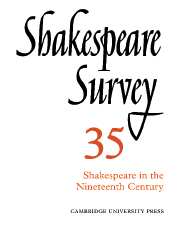Book contents
- Frontmatter
- Before the Shakespeare Revolution: Developments in the Study of Nineteenth-Century Shakespearian Production
- The Meininger Company and English Shakespeare
- Shakespeare at the Burgtheater: From Heinrich Anschütz to Josef Kainz
- Shakespeare on the Melbourne Stage, 1843-61
- Shakespeare in Hazlitt’s Theatre Criticism
- Characterization of the Four Young Lovers in A Midsummer Night’s Dream
- Queenly Shadows: On Mediation in Two Comedies
- Language, Theme, and Character in Twelfth Night
- The Art of the Comic Duologue in Three Plays by Shakespeare
- ‘Spanish’ Othello: The Making of Shakespeare’s Moor
- Ferdinand and Miranda at Chess
- Shakespeare’s Latin Citations: The Editorial Problem
- The Theatre at Christ Church, Oxford, in 1605
- Interpretations of Shakespearian Comedy, 1981
- The Year's Contributions to Shakespearian Study 1 Critical Studies
- 2 Shakespeare’s Life, Times and Stage
- 3 Textual Studies
- Index
- Plate Section
Shakespeare at the Burgtheater: From Heinrich Anschütz to Josef Kainz
Published online by Cambridge University Press: 28 March 2007
- Frontmatter
- Before the Shakespeare Revolution: Developments in the Study of Nineteenth-Century Shakespearian Production
- The Meininger Company and English Shakespeare
- Shakespeare at the Burgtheater: From Heinrich Anschütz to Josef Kainz
- Shakespeare on the Melbourne Stage, 1843-61
- Shakespeare in Hazlitt’s Theatre Criticism
- Characterization of the Four Young Lovers in A Midsummer Night’s Dream
- Queenly Shadows: On Mediation in Two Comedies
- Language, Theme, and Character in Twelfth Night
- The Art of the Comic Duologue in Three Plays by Shakespeare
- ‘Spanish’ Othello: The Making of Shakespeare’s Moor
- Ferdinand and Miranda at Chess
- Shakespeare’s Latin Citations: The Editorial Problem
- The Theatre at Christ Church, Oxford, in 1605
- Interpretations of Shakespearian Comedy, 1981
- The Year's Contributions to Shakespearian Study 1 Critical Studies
- 2 Shakespeare’s Life, Times and Stage
- 3 Textual Studies
- Index
- Plate Section
Summary
On 17 May 1896, one of the most eminent actors of the Vienna Burgtheater, Adolf von Sonnenthal, celebrated his fortieth anniversary with the company. Sonnenthal was widely recognized as the actor who most completely embodied the much-vaunted Burgtheater tradition, so a public statement by him on the changes that had taken place during his long career was in order. It was done through publication in the Neue Freie Presse of an open letter from Sonnenthal to Ludwig Speidel, the newspaper’s theatre critic. Given the auspicious nature of the occasion, it might have been hoped that Sonnenthal would issue a ringing affirmation of confidence in the Burgtheater of the day, but such was not to be. Far from seeing the previous forty years as a steady progression towards a stronger company, Sonnenthal clearly felt they had represented a decline. For him the Burgtheater had reached its zenith when he had joined the company back in the 1850s. Then the most representative actor was Heinrich Anschiitz, to whom Sonnenthal refers with almost loving respect:
When Anschiitz stood . . . on stage as Lear or Musikus Miiller . . . one saw how every fibre of this man trembled at every word, how he turned our hearts round and around through the plasticity of his tastefully restrained speech, how, his own eyes full of tears, he made us weep and sob, how, through completely unfolding the character, he allowed us to forget the handiwork of the stage. . . . [Anschiitz's acting combined] truth and nature itself, without once needing to overstep the limits of the beautiful.
- Type
- Chapter
- Information
- Shakespeare Survey , pp. 21 - 30Publisher: Cambridge University PressPrint publication year: 1982



